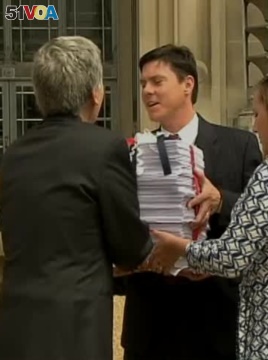August 14,2014
WASHINGTON— The First Amendment to the U.S. Constitution protects freedom of the press, but the government and journalists sometimes clash over its meaning. Author and New York Times reporter James Risen refuses to reveal a source about a CIA operation in Iran in his 2006 book State of War.

A stack of papers with about 100,000 names calls on the U.S. government to stop all legal action against James Risen. The online petition from advocacy group RootsAction also urges journalists to safeguard the confidentiality of their sources.
Risen's book details a Central Intelligence Agency effort to undermine Iran’s nuclear program during the administration of President George W. Bush. That administration identified the man it alleges leaked the information and subpoenaed Risen to identify his source, which he refuses to do.
Critics of these leaks say they are illegal and can jeopardize the government’s capacity to protect the public.
RootsAction co-founder Norman Solomon handed the petition to a Justice Department official.
"We want the Justice Department to stop its attempt to force James Risen to betray his sources, and we want an affirmation that the First Amendment must include the freedom of journalists to tell unofficial stories without fear of being - going to jail or hit with very harsh fines," said Solomon.
Courtney Radsch with the Committee to Protect Journalists said Risen’s journalistic integrity is crucial.
"The ability to keep sources confidential is essential to the practice of journalism, and it’s very difficult for journalists to be able to do their job, which is upholding democracy and ensuring that the government is transparent and accountable if they’re not allowed to keep their sources confidential," said Radsch.
At the National Press Club in Washington, Risen blamed the Justice Department and the Obama administration for what he called a fundamental fight over press freedom.
"So they turned this case into a showdown over the First Amendment and the freedom of the press in the United States. So I am happy to carry on that fight but it wasn’t really me who started it," said Risen.
Risen brought his case to the U.S. Supreme Court, which declined to intervene.
Ahmed Ghappour, a lawyer who works with the Freedom of the Press Foundation, said the Justice Department can jail or fine Risen, or resolve the situation so Risen doesn’t have to name his source.
“He broke no law in proliferating the news and publishing his articles and books. Nor can the Justice Department make such claims. Indeed, there is no law that mandates the press to obtain government approval about lawfully acquired information,” said Ghappour.
The Justice Department has declined to comment publicly on the case.